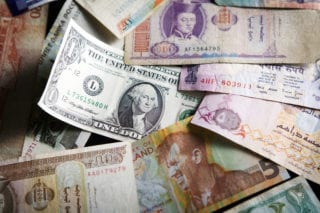 If you plan to live overseas for a year or more, you’ll benefit from having a bank account abroad. When you are earning in your new country, or buying real estate there, you may need a bank account immediately. Or you may just become tired of paying high fees for ATM withdrawals and day to day transactions.
If you plan to live overseas for a year or more, you’ll benefit from having a bank account abroad. When you are earning in your new country, or buying real estate there, you may need a bank account immediately. Or you may just become tired of paying high fees for ATM withdrawals and day to day transactions.
If you are living overseas as a digital nomad, earning money from your home country as you travel, you may not need an international bank account. Still, the longer you stay in a new country, and the more financial services you need there, the more positives there are to having a bank account where you live.
How do you decide which bank to join in a new country? Especially when you need strong international services? Based on expatriate life and the realities of international bank accounts, here are five tips for choosing a bank account abroad.
1. Consider an International Bank with Expat Services
One solution to having a bank account abroad is to find a bank with branches in both your home country and your expat country. This is a strong option for foreigners whose financial lives overlap with one or more countries.
Which international bank is best for you? This depends on your finances and your home country. For example, many United States expatriates use Charles Schwab’s international services.
Some international banks require that you maintain a high balance to get their international services – from $75,000 to $200,000 in money and investments. If you are early in your investing life and your career, you’ll do better with a local bank account in your new country. And if you are investing or borrowing in your new country, again, you may find that a local bank provides better rates than a large international bank.
Read Also: Top 10 International Tax Firms for Expats
2. Check Deposit Insurance for Accounts
Most countries have deposit insurance for their banking systems. Deposit insurance protects depositors’ funds at banks from the failure of that bank. With deposit insurance, the government insures the accounts up to a certain amount. That way, even if a bank fails, depositors get all or most of their money.
The most recent peak of bank failures took place between 2008 and 2011 around the 2008 global financial crisis. In the U.S., 157 banks failed in 2010. In the UK, five banks failed in 2008 – affecting over 4 million customers. In response, between 2010 and 2020, many countries improved their banks’ risk ratings and their deposit insurance programs. The result has been fewer failures of regulated banks. Yet these failures do still happen, such as Silicon Valley Bank in 2023.
Different countries provide different amounts of deposit insurance. European Union countries provide $107,000 USD of coverage. In contrast, Costa Rica only provides $10,000 USD of coverage. Some places, like Israel and the Cayman Islands, don’t provide any deposit insurance. International banks that have branches in more than one country provide deposit insurance based on the country where you join that bank.
When you know what your new country provides for bank deposit insurance, you can decide how to manage your money. You may choose to keep savings and investments where they are best protected by deposit insurance. That may be in your home country, in an international bank, or your new country.
3. Ask About International Financial Services and Transaction Fees
Having a bank account in your new country will save you money every day compared to using a foreign credit or ATM card. Your transaction fees will be lower: ATM transactions may even be free. But before you choose a bank abroad, think about what international financial services you need from your bank. Then, check on fees for those transactions.
You can expect to pay fees for these international financial transactions:
- International bank transfers
- Depositing international checks
- Currency exchange
These fees may be a per-transaction fee or a percentage fee. If it is a per-transaction fee, and you have infrequent, large transactions, the cost may be reasonable.
Banks overseas may also have more liberal overdraft policies with lower or no fees. This makes it very easy to run up a substantial overdraft without noticing. Ask your bank about their overdraft policy. If you can choose, set your overdraft at a value that works for you. A value of $500 USD or less provides overdraft protection while avoiding a major drain on your cash flow.
4. Ask About Wait Times For New Accounts
When you start an international bank account, your account may be available immediately. But it is more likely that there will be a waiting period before your account is live and funds are available.
Why is there a waiting period? Your international identification must be verified. If you are transferring currency internationally, that can take time to be processed with checks and balances. And changes and pressure on banks since 2020 add to the wait time for accounts for all customers. Overall, expect a waiting time of one to six weeks before your new account is live.
When you know the wait time, you can prepare yourself with cash or credit for what you need until you can access your bank accounts. You can also ask your new bank if there is any way to expedite your new account.
If you know the bank you want to join, and the date when you are moving overseas, set up your bank account abroad before you move. That way, your new account will be ready for you when you need it.
Read Also: Top 10 Savings Tips for Expats
5. Be Prepared To Bank Online
Many international banks provide most of their services online. They have fewer physical locations and fewer bank tellers. In Australia, for example, only 0.2% of bank transactions involve checks: most transactions are online transfers or bank card use. In some countries many of these transactions connect to national payment networks available as apps, such as DuitNow in Malaysia and Singapore’s PayNow.
Being confident with online banking is especially important for people seeking to retire overseas. Your bank in your home country may have a location to visit and staff who have known you for years. In your new country, banks are likely to focus on online services. You may also have a language barrier if you are still learning your new country’s language. Make sure that your new bank supports at least one of the best ways to transfer money – this will allow you to move money between your old and new account.
If online banking is difficult for you, ask a relative or friend you trust to show you what to do. Some countries offer online banking workshops for seniors.
A Final Tip: Keep Your Bank Account In Your Home Country
Once you give up a bank account in your home country, it can be a challenge to get it back. Try to keep it for your first five years of life overseas. Check in with this account and do some minor transactions every month to three months. This avoids your account being shut down for inactivity. After five years, you can review your life and your banking needs, and make a good decision.
People everywhere tend to stay with a bank they’ve chosen for a long time – 15 to 19 years. When you choose a bank in a new country, it’s an opportunity to support your economic wellbeing. Take the time to ensure that you’re making the best choice for you, and you’ll feel confident sticking with your own international bank account.
Related Articles:

